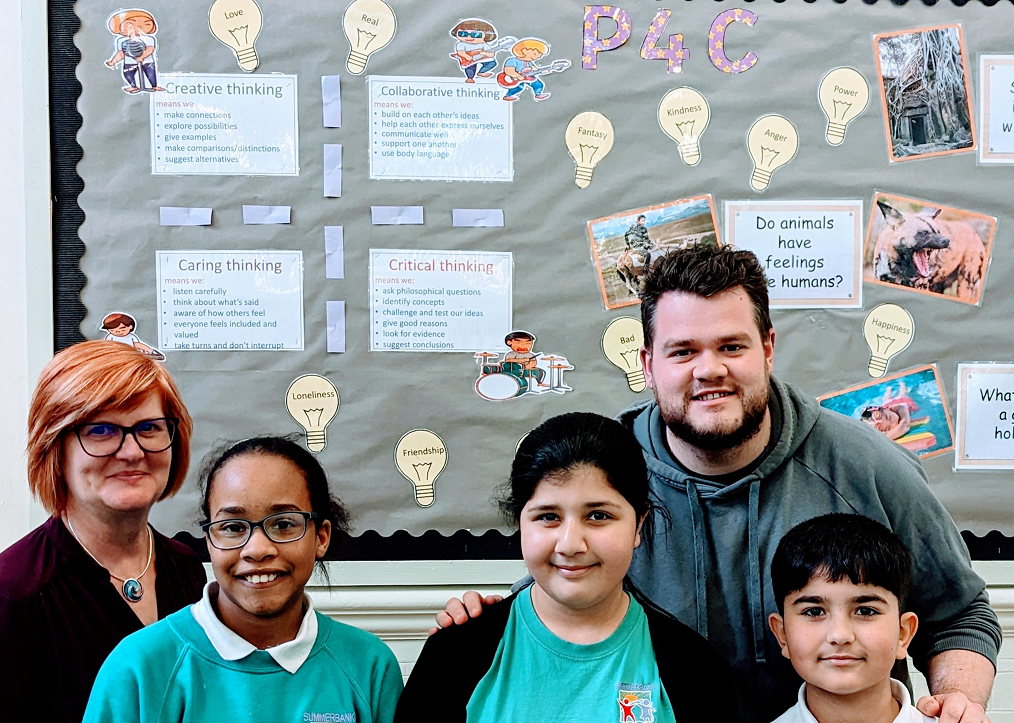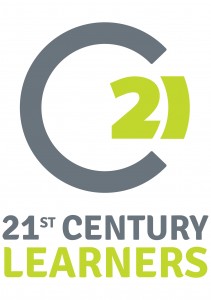P4C in a diverse environment – an EAL perspective from Summerbank Primary Academy

A voice for everyone
Teachers from Summerbank Primary Academy had early misgivings about Philosophy for Children (P4C). Back in 2018 they joined colleagues from across The Societas Trust (a multi-academy trust in Staffordshire and Stoke-on-Trent) – for Level 1 training. Summerbank had, and still has, a high proportion of pupils with English as an additional language (EAL), and the teachers’ disquiet was evident: ‘This sounds great, but how will it look in our school?’
I visited the academy recently to have conversations with P4C leaders Sarah Johnson and James Thomas, and pupils Zoya, Khatija, San and Yagen (whose first languages are Urdu, Kurdish and Arabic), about their experiences since being introduced to P4C. James put the early anxiety into shaper relief: ‘Our school is massively based on inclusion, and everyone has a voice. We were concerned that P4C might be an exclusive practice resulting in a group of children who could access it, and a group of children who couldn’t’.
James and Sarah were colleagues in Year 2 when P4C was introduced to the school, and they took their tentative first steps using the stimulus ‘This is Owl’ by Libby Walden, as suggested in SAPERE’s Getting Started Guide. James shared his memories of the session:
‘We did that session sat in a circle and everyone was included. We did have some children who didn’t speak English, but we immediately began learning about the different ways in which we could make the sessions more inclusive, and we felt that we could see the benefits straight away – from the children listening to each other, and from them being able to talk to each other and learning about language choices.’
There was a quick turnaround in James’s thinking about P4C with his class: ‘After session one, we could absolutely see that this could be beneficial for everybody in the class’. And it wasn’t just James who was persuaded; the pupils were liberated by the idea that P4C was a ‘new subject’ in which there were no limits on what they could achieve – and, importantly for some children, there was no writing. ‘From lesson one, they absolutely loved it,’ said James.
San and Khatija were quick to speak about their own enjoyment of P4C. Khatija told me: ‘I like that everybody gets to join in and people who don’t speak English really well, they know more words because other people are speaking so they get the new words that they haven’t heard before’. Zoya said that she remembers not knowing a single word in English. When asked about the words she had learned through P4C she spoke about language that allowed her to express agreement and disagreement, and about the 4Cs – caring, collaborative, critical and creative thinking.
Summerbank achieved a SAPERE Bronze Award in 2020 and are now on the cusp of submitting their application for a Silver Award. I was interested to know more about how they have adapted their practice over time.
One approach that has had a significant impact is the use of ‘wordless’ stimuli, including pictures, short films and music. Teachers saw that this approach gave all children, regardless of their language skills, the chance to interpret the stimulus and identify concepts for themselves. Yagen expanded on this saying: ‘We get to identify the underlying themes for ourselves – what the film is really trying to say’. James pointed out that the use of wordless stimuli ‘has been really powerful for children with EAL, but just as beneficial for children who do speak English fluently’. Care is also taken to make sure that the stimulus materials used reflect the diversity of the pupils so that everyone can see themselves represented in the stimuli and feel that they belong to the community.
Concept matching is another approach that the school have developed. Teachers look ahead through the books being read in class to identify words that may cause confusion to some pupils – the word ‘knowledge’ in Tony Bradman’s Viking Boy, for example. Images related to the word are collected and used to stimulate discussion about its meaning, preparing pupils for an encounter with the word in the text and also supporting them to apply it accurately in their own writing. Inevitably, the different images (and perhaps the different connections that pupils make to related words in their own languages) lead to varying accounts of a concept’s meaning and so to more nuanced understanding for everybody. These concepts form the basis of P4C sessions and are re-visited as pupils progress through the school, with a deepening understanding becoming visible. Sarah has noticed this effect when watching pupils she taught in Year 2 engaging in P4C in Year 4: ‘The difference in the children – their verbal activity, their ability to give examples and link concepts to their own experience is just amazing.’
Sarah emphasised that teachers pay careful attention to seating when the Community of Enquiry is convened: pupils with limited English are generally seated near to a peer who is more confident in the language, providing opportunities for pupils to listen to and learn from their peers as well as from the facilitator. This has the added benefit of encouraging those who are less confident to rehearse the expression of their ideas in small groups, increasing the likelihood of them sharing their thinking back in the whole-group forum. Where necessary, the more confident pupils can share the less confident pupils’ ideas, and the school’s EAL specialist Teaching Assistants also play a valuable role in ensuring that all voices are heard.
And making sure that all voices are heard is at the heart of the inclusive ethos at Summerbank; whether it be through responses to ‘yes / no’ questions or through physical movement, every child is given the opportunity to express themselves. Even when pupils don’t speak in a session, they are often celebrated for their listening and the impact that this has on others.
Windows on the world
Reflecting on the concepts she has explored, Yagen described a recent enquiry about emotion. The children had discussed whether, if they had a button they could press to regulate their emotions – to stop them feeling sad, for example, they would press it. She distinguished between feeling happy on the inside and on the outside, saying that although it was possible to fake happiness outwardly, it would never match the emotion felt ‘deep down’. She went on to talk about how P4C supported her writing by giving her opportunities to practise using words in different contexts, and about her enjoyment of metaphor, relating how she used the expression ‘What happens in the dark always comes into the light’ to explain the difficulty of keeping secrets, especially guilty ones.
As Yagen spoke, my perspective on P4C in a multi-cultural and multi-lingual environment changed. I had come to Summerbank to enquire about how the challenges presented by such diversity could be overcome (I was looking through a ‘defecit lens’), but had perhaps been blind to the wonderful resources that the children bring to the Community of Enquiry (I lacked an ‘asset lens’). They bring diversity of experience, of course, but also diversity of cultural wisdom and the additional perspective that another language provides. As Yagen spoke about matching different images to the word ‘lonely’, I wondered how the concept is expressed in their own languages and how it may take on subtly different meanings in different cultural contexts. I remember reading the Chinese proverb, ‘To learn a language is to have one more window from which to look at the world’. I think that learning to look at life through different windows is a good way to express the value of P4C; a school full of children who offer us different windows, different perspectives on human experience, seems less a barrier to P4C and dialogue, and more a wonderful and enriching opportunity. (In this article for the Chartered College of Teaching, Jacob Huckle discusses viewing EAL learners through a deficit or an asset lens, as well as arguing for the importance of equity).
I’ll leave it to James to sum up the impact of P4C at the academy:
‘Summerbank is inclusive and that’s massive when it comes to our P4C sessions. Everyone is included, everyone is valued and everyone is loved in that circle; no matter what ability you are, you are a massive part of what we do. Those children who don’t necessarily write the best, don’t necessarily add up the best, aren’t the best at sport, they get the chance to be heard, to be spoken about and to be valued, and that is what we feel P4C is all about at Summerbank.’



